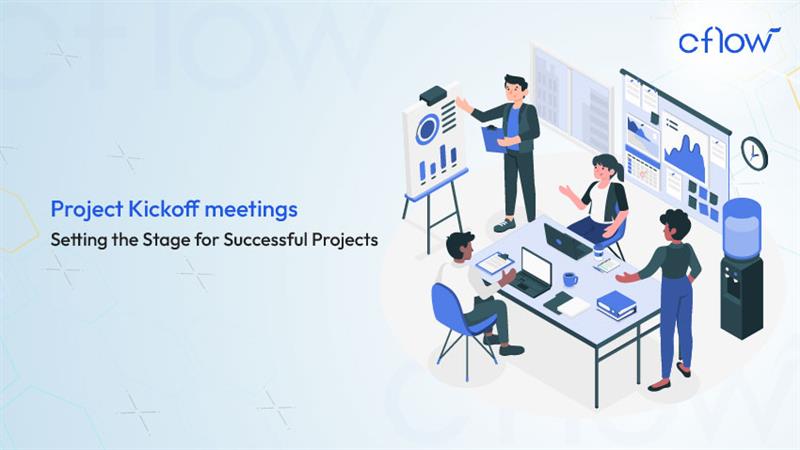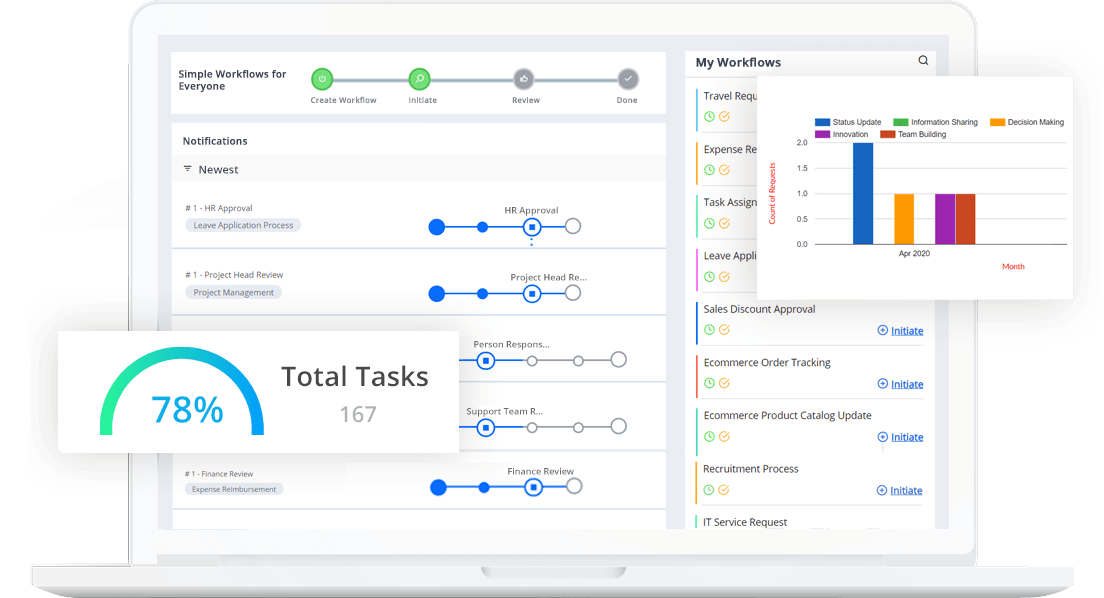Project Kickoff Meetings: Setting the Stage for Successful Projects

Key takeaways
- Project kickoff meetings establish alignment, clarity, and collaboration among stakeholders from the very beginning.
- A well-structured kickoff for project management ensures clear objectives, expectations, and responsibilities for all involved.
- An effective project kickoff meeting agenda improves team coordination and prevents project delays and miscommunication.
- Cflow streamlines project kickoff processes by automating workflows, improving collaboration, and providing real-time task visibility.
A project kickoff meeting is a crucial step in launching a project successfully. It sets the tone, ensures alignment among stakeholders, and establishes a clear path forward. Whether you’re managing an internal project or working with external clients, a well-planned kickoff for project management is essential for avoiding confusion and delays. Without a proper project management kickoff meeting, teams may struggle with unclear expectations, poor communication, and misalignment between goals and deliverables.
In this blog, we’ll explore the fundamentals of project kickoff meetings, their importance, best practices, and a step-by-step approach to conducting a successful kickoff meeting for a project. Additionally, we’ll discuss how Cflow can streamline the process and enhance collaboration.
What Is a Project Kickoff?
A project kickoff is the official start of a project. It brings together stakeholders, defines objectives, and ensures alignment on expectations. This initial phase helps teams establish priorities, assign responsibilities, and discuss potential risks before execution begins. A successful kickoff ensures that everyone is on the same page, reducing the likelihood of miscommunication and project failure.
Table of Contents
What Is a Project Kickoff Meeting?
A project kickoff meeting is a structured discussion held before a project begins. It serves as a platform to align stakeholders, clarify expectations, and define project scope. The meeting ensures that all participants understand their roles and responsibilities while setting the foundation for seamless collaboration.
A well-organized project management kickoff meeting typically covers:
- Project Objectives and Scope: Clearly define the project’s purpose, goals, and boundaries to ensure alignment among stakeholders and prevent scope creep.
- Roles and Responsibilities of Team Members: To ensure accountability, collaboration, and efficient task execution, assign clear roles to team members and outline their responsibilities.
- Project Timeline, Key Milestones, and Deliverables: Establish project phases, deadlines, and expected deliverables to keep the team on track and measure progress effectively.
- Success Criteria and Risk Management Strategies: Define measurable success factors and identify potential risks to develop mitigation plans and ensure project completion within constraints.
- Communication Protocols and Reporting Mechanisms: Set up communication guidelines, reporting frequency, and tools to keep all stakeholders informed and facilitate transparency throughout the project.
A kickoff meeting enhances engagement, facilitates smooth execution, and boosts project success rates.
Why Should You Have a Project Kickoff?
A project kickoff meeting is essential for setting a strong foundation for project success. It ensures that all stakeholders are aligned, expectations are clear, and collaboration is seamless. By discussing key project elements like objectives, responsibilities, and communication methods early on, teams can avoid potential roadblocks and improve efficiency. A well-structured kickoff meeting helps define success criteria, minimizes risks, and fosters a sense of teamwork. Below are five key reasons why having a project kickoff is crucial for any project.
1. Introduce the Team
A project kickoff meeting allows team members to meet, understand each other’s roles, and establish working relationships. This initial interaction fosters collaboration, improves communication, and ensures clarity on responsibilities. When team members know who to approach for specific tasks or issues, it enhances overall workflow and prevents unnecessary delays.
2. Create a Shared Understanding of the Project Background
Providing project context helps all stakeholders align on the purpose, scope, and expected outcomes. By clearly outlining project objectives, constraints, and key milestones, teams can avoid confusion and work towards a common goal. This shared understanding ensures that every team member is on the same page from day one.
3. Ensure Alignment on a Successful Project Outcome
Defining project success metrics upfront ensures that everyone understands what is expected. Whether it’s meeting deadlines, staying within budget, or achieving specific business goals, setting clear criteria for success keeps the team focused. This helps measure progress accurately and improves accountability throughout the project lifecycle.
4. Get an Agreement on Deliverables and Responsibilities
Ambiguity in task distribution can lead to project setbacks. A kickoff meeting clarifies individual and team responsibilities, ensuring that everyone knows their role and what is expected of them. Establishing accountability early on minimizes misunderstandings, streamlines execution, and promotes efficient resource allocation.
5. Decide on Collaboration and Communication Methods
Effective collaboration depends on streamlined communication. A project kickoff meeting helps teams decide which communication channels, reporting structures, and project management tools will be used. Defining these aspects in advance ensures smooth information flow, prevents miscommunication, and enhances overall project coordination.
Who Should Attend the Kickoff Meeting?
A project kickoff meeting brings together key stakeholders to ensure alignment, establish expectations, and define responsibilities before project execution begins. The success of a project depends on having the right people involved from the start, as their input and decision-making influence the entire process. Attendees should include individuals who provide strategic direction, oversee execution, and contribute insights to ensure smooth collaboration. Below are the key participants who should attend a project management kickoff meeting and their roles.
1. Project Sponsor
The project sponsor is a senior executive or stakeholder who provides funding and strategic direction for the project. Their role is to ensure that the project aligns with business objectives, secure necessary resources, and resolve high-level challenges. The project sponsor also provides approvals at critical stages and ensures executive support throughout the project lifecycle.
2. Project Manager
The project manager plays a central role in leading the project kickoff meeting, setting the agenda, assigning responsibilities, and ensuring alignment among team members. They are responsible for defining project goals, establishing timelines, identifying risks, and managing day-to-day operations to keep the project on track.
3. Project Stakeholders
Stakeholders include individuals or groups impacted by the project, such as clients, end-users, department heads, or external partners. Their input is crucial in shaping the project’s direction, setting expectations, and ensuring that deliverables align with business needs. Engaging stakeholders early helps prevent misalignment and potential conflicts later.
4. Steering Committee
The steering committee comprises senior leaders and decision-makers who oversee the project’s alignment with business objectives. They provide high-level guidance, help resolve major roadblocks, and ensure the project adheres to corporate strategy. Their involvement in the kickoff for project management ensures that the project has the necessary support and approval at critical milestones.
What to Cover in the Kickoff Meeting?
A well-structured project kickoff meeting agenda ensures that all team members understand project objectives, responsibilities, and expectations. Covering the right topics in the meeting helps set a clear path for execution while addressing any uncertainties upfront. Below are the key areas that should be included in a kickoff for project management to ensure a smooth project launch.
1. Introductions
Every project kickoff meeting should begin with introductions to help establish familiarity among team members. Each participant should state their name, role, and responsibilities within the project. This helps create a collaborative environment and ensures everyone understands who to approach for specific tasks and concerns.
2. Project Background
Providing an overview of why the project is being undertaken ensures that all attendees have a shared understanding of its purpose. The project background should include details on business objectives, challenges being addressed, and any key motivators driving the project. This context helps team members stay aligned and engaged throughout the project lifecycle.
3. Project Briefing
The project briefing defines critical elements such as scope, deliverables, and timelines. The project manager should outline what the team is expected to achieve, along with deadlines for each milestone. Clearly defining these aspects helps prevent scope creep and sets realistic expectations from the start.
4. Project Success Criteria
Establishing clear success criteria ensures that all stakeholders are aligned on what constitutes a successful project. This could include meeting deadlines, staying within budget, achieving specific KPIs, or maintaining high-quality standards. Defining these metrics at the beginning helps the team focus on the most critical objectives.
5. Project Management Approach
Outlining the project management kick-off meeting strategy helps in defining how the project will be executed and monitored. This includes selecting project management tools, defining communication protocols, setting up reporting structures, and discussing risk management strategies to ensure smooth project execution.
6. Any Other Business
This section allows team members to ask questions, voice concerns, or raise additional topics that need to be addressed before moving forward. Addressing these concerns ensures that the project starts with clarity and minimizes potential misunderstandings.
7. Next Steps
Before concluding the kickoff for project management, define immediate action items for all team members. Assign responsibilities, set deadlines, and establish a follow-up plan to ensure that the momentum from the kickoff meeting translates into action. Clear next steps provide direction and accountability for project execution.
End-to-end workflow automation
Build fully-customizable, no code process workflows in a jiffy.
How to Do a Project Kickoff in 15 Steps
A structured project kickoff meeting is essential for setting clear expectations, aligning team members, and ensuring a smooth project launch. By following a step-by-step approach, teams can streamline planning, define responsibilities, and establish communication channels. Below are 15 key steps to kick off a project successfully, ensuring clarity and efficiency from the start.
Before the Kickoff Meeting:
- Review the Brief – Ensure all critical project details are included.
- Determine Meeting Attendees – Identify key stakeholders and team members.
- Schedule the Meeting – Choose a suitable date, time, and location.
- Share Project Documents – Distribute relevant materials ahead of time.
- Send an Invitation with Agenda – Provide attendees with an agenda for better preparation.
During the Kickoff Meeting:
- Break the Ice – Start with light-hearted engagement to create a comfortable atmosphere.
- Align on Project Goals – Reiterate primary objectives and key success criteria.
- Set Key Performance Indicators (KPIs) – Define measurable outcomes.
- Break Down the Project Phases – Outline timelines, milestones, and task dependencies.
- Identify Risks and Challenges – Discuss potential roadblocks and mitigation strategies.
After the Kickoff Meeting:
- Summarize Meeting Notes – Document key takeaways and agreements.
- Develop a Project Plan – Create a detailed roadmap for execution.
- Store Documents in a Centralized Location – Ensure easy access to important files.
- Create a Resource Calendar – Assign responsibilities and establish timelines.
- Follow Up with Stakeholders – Send a recap email with the next steps and action items.
How Cflow Supports Seamless Project Kickoffs
Cflow is an AI-powered workflow automation tool designed to enhance efficiency in project kickoff meetings by streamlining collaboration, automating processes, and ensuring smooth project execution. By eliminating manual inefficiencies and providing real-time tracking, Cflow helps project managers and teams focus on strategic planning rather than administrative tasks. Here’s how Cflow optimizes project kickoffs:
1. Automated Project Workflows
Cflow enables teams to automate repetitive tasks, reducing the time spent on manual processes during project initiation. From assigning responsibilities to setting up approval workflows, Cflow ensures a structured and efficient project setup, allowing managers to focus on high-value decision-making.
2. Real-Time Collaboration
Effective communication is key to a successful project kickoff meeting. Cflow provides a centralized collaboration hub where team members can share updates, communicate in real-time, and stay aligned with project objectives. By integrating with communication tools, Cflow enhances cross-team coordination and minimizes miscommunication.
3. Centralized Document Management
Managing project-related documents is crucial for transparency and efficiency. Cflow offers secure, centralized document storage, ensuring that project charters, stakeholder information, and key planning materials are easily accessible. This eliminates version control issues and ensures all team members are working with up-to-date information.
4. Automated Reporting and Progress Tracking
Keeping track of project milestones, KPIs, and deadlines is simplified with Cflow’s automated reporting capabilities. Project managers can generate real-time reports that provide insights into progress, identify bottlenecks, and ensure the project remains on track from initiation to completion.
5. Task and Responsibility Allocation
One of the most critical aspects of a successful project kickoff is ensuring that every team member understands their role and responsibilities. Cflow helps project managers assign tasks efficiently, track accountability, and ensure seamless execution of action items post-kickoff.
Final Thoughts
A well-executed project kickoff meeting lays the groundwork for a successful project by ensuring alignment, defining objectives, and fostering collaboration. By following structured kickoff meeting best practices, teams can minimize risks, enhance efficiency, and boost project success rates.
Cflow simplifies project kickoff processes by automating workflows, tracking progress, and ensuring seamless team collaboration. Ready to streamline your project management approach? Sign up for Cflow today and set your projects up for success!
FAQs
1. What is the purpose of a project kickoff meeting?
A project kickoff meeting sets the foundation for a successful project by aligning stakeholders, defining objectives, and clarifying expectations. It ensures teams understand their roles, responsibilities, and project scope from the start.
2. How do you structure a project kickoff meeting?
An effective kickoff meeting requires clear agendas, team introductions, project goals, deliverables, and collaboration strategies. Using structured workflows and automation tools like Cflow helps streamline communication, task allocation, and documentation management.
3. What are the benefits of a well-planned kickoff meeting?
A kickoff meeting agenda should cover introductions, project background, scope, success criteria, project management approach, risk mitigation, collaboration tools, and next steps to ensure alignment and clarity among all team members.
What should you do next?
Thanks for reading till the end. Here are 3 ways we can help you automate your business:

Do better workflow automation with Cflow
Create workflows with multiple steps, parallel reviewals. auto approvals, public forms, etc. to save time and cost.

Talk to a workflow expert
Get a 30-min. free consultation with our Workflow expert to optimize your daily tasks.

Get smarter with our workflow resources
Explore our workflow automation blogs, ebooks, and other resources to master workflow automation.
What would you like to do next?
Automate your workflows with our Cflow experts.



